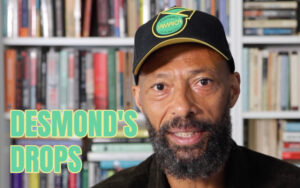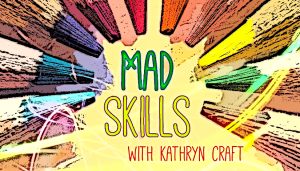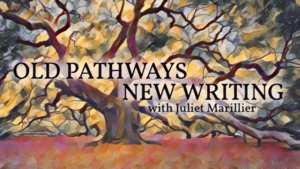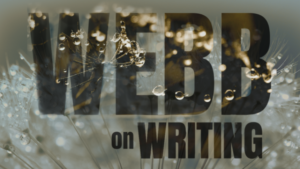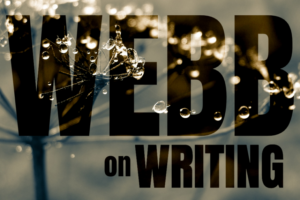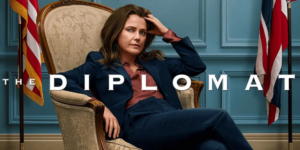Inspirations
Welcome to a new edition of Desmond’s Drops!
This month, enjoy three drops focused on one topic–lessons for writers from the world of FILM.
Email subscribers, please click directly to staging-writerunboxed.kinsta.cloud to view or visit all of Demond’s Drops on YouTube.
Look for more of Desmond’s Drops in September!
Have your own bit of wisdom to share? Something you’ve learned from the world of films? Drop it in comments.
Read MoreImagine a typical writing day. Let’s see if yours and mine are anything alike.
How does anyone ever get any actual writing done?!
It turns out that there’s a lot more to a ‘writing’ life than trying to put words on the page.
How I Broke A Bunch Of Talented Writers
Last year Writer Unboxed invited me to talk at the WU OnConference about this very conundrum.
I shared my method for untangling the big ball of ‘stuff’ that makes up this thing we call ‘writing’ so that you can make sure you’re always making progress in one of the 7 areas I’ve identified as distinct parts of the writing life.
As I broke it down for them, I got to watch the comments scrolling past.
“OMG”
“I had no idea…”
“No wonder if feels so hard!”
These brilliant, sensitive, compassionate, creative, accomplished writers slowly realized they’d had no idea how much work they were actually doing.
And, most powerfully, how little credit and compassion they were giving themselves.
And it broke their hearts a little bit, in what I hope was a good way.
I’m going to share with you a quick breakdown of the parts of the writing life, and a summary of the exercise I shared with the OnConference attendees, that caused all those little lightbulbs to blow.
I hope it helps you recognize how much there is to do, how much you’re already doing, how much progress you’ve already made, and make decisions about the best investment of your energy each time you sit down at your desk.
The I, WRITER Framework for a Writing Life
The idea behind this I, WRITER Acronym is this:
Everything you do in your writing life can be grouped in a certain category of task or action. This allows you to focus on one category at a time, so that you’re not zig zagging all over the place and feeling like you’re not making any progress.
Of course, sometimes the different layers of your writing life will overlap, the way they do in the illustration.
But notice, too, that the place where the strata overlap is a fault line.
It’s where the rock was weakest.
And it’s kind of a mess.
You don’t want to spend all your time in the cracks..
Instead, when you sit down to work, you want to be able to focus on one […]
Read Morephoto adapted / Horia Varlan
If a stranger standing beside you on a train track simply blurted that they loved you, you wouldn’t believe them, would you? You’d want substantiation. Some clue that they weren’t a stalker, or that their emotions had been building over time. That’s because true love, ideally, is specific to the personhood of the two individuals involved—and something that both participants would like to be in on.
In stories, readers want in on it too—and like everything else in fiction, that requires showing. Yet so often, in the manuscripts I see that feature a romance, the writer has basted together a relationship with the thinnest of threads, while at the same time asking that readers buy that what they’re selling is love.
Since a well-developed romantic thread can keep readers of any genre turning pages, let’s look at some of the ways authors have successfully convinced readers that their characters are falling in love. Maybe one (or more!) of them will work in your story.
1. Show that love changes the character.
In A Man Called Ove by Fredrik Backman, Ove first sees the woman he’ll marry on a train platform, just as in my silly example above. But Backman convinces. Ove is compelled to follow her onto her train, which takes him two hours from home in the wrong direction. After sitting across from her to chat, Sonja tells him she takes the train back each day at 5, so maybe they’ll cross paths again—inciting him to loiter in the town where she’s attending school just so he can sit with her again on the way home. He does this for three weeks. She has a profound effect on him:
He had never heard anything quite as amazing as that voice. She talked as if she were continuously on the verge of breaking into giggles. And when she giggled she sounded the way Ove imagined champagne bubbles would have sounded if they were capable of laughter.
2. Show that the character wants to support their beloved in being the best version of themselves.
In Where the Crawdads Sing by Delia Owens, a young man named Tate teaches self-raised protagonist Kya to read, opening her mind to the science behind the marsh she loves. One day he brings her a wrapped gift—a second-hand Webster’s Dictionary—and tells her to look inside.
Tucked in the P section was a pelican feather, forget-me-not blossoms pressed between two pages of the Fs, a dried mushroom under M. So many treasures were stashed among the pages, the book would not completely close.
3. Show that the character can’t stop thinking of their beloved—even beyond death.
In Jane Austen’s Persuasion, protagonist Anne Elliot allowed her family to persuade her that the sailor she loved was not a prospect who could secure her future. When the story begins, she has been pining for him for almost eight years‚ so when they meet again, the stage is set for sparks to fly.
From their beginnings on the train in example #1, Ove and Sonja stay married almost four decades until Sonja dies. Six months later, at the opening of the novel, Ove is suicidally depressed; he still […]
Read More
In traditional storytelling, especially in fairy tales, the main characters often don’t have names. Instead they are referred to only by their roles: the tailor, the shepherdess, the knight, the princess, the giant. When a character does get a name, often it’s an emblematic sort of name, like Snow White (named for her skin as white as snow) or Rapunzel (named for the herb her mother stole from the witch’s garden.) Then there’s Prince Charming, named thus (I guess) because his parents assumed he’d grow up to be much admired, and would learn pretty court manners in preparation for the prince job. Jack (of Jack and the Beanstalk) has a real name; but you’ll find quite a few different stories with a Jack in them, and he’s usually making mischief and/or getting into trouble, so that one may be emblematic as well – what about the Jack in a card deck, also known as the Knave? Generally those stories are not big on character development. We may have a dramatic change of circumstances: the goatherd slays the dragon and gets to wed the princess (too bad it she’s not keen on the idea); the tailor is kind to the elves and is given magical assistance as a reward. But an individual human journey that draws us in deeply? Generally not. Maybe fairy tale characters don’t need names.
Legends are different, being almost always associated with a particular location, a notable event that took place (or may have taken place) there, and a person or being: Robin Hood, William Tell, King Arthur. Each of those has some historical basis, but in the cases of Arthur and Robin, the old story has morphed over the years into an elaborate piece of (mostly) fantasy. For Arthur and the Knights of the Round Table, this is largely down to a twelfth century Welsh cleric and writer, Geoffrey of Monmouth, and to a lesser extent to Chrétien de Troyes, a French writer of the same general period. There are many more such examples. The stories are grand, heroic, stirring, and often deeply romantic, and they’ve been retold and rewritten over and over right to the present day. The retellings and reworkings tend to reflect the culture and values of their time; the storyteller shapes the tale to resonate with its audience. Generally the original character names, or recognisable versions of them, remain.
Today’s writers, and fantasy writers in particular, have produced some ground-breaking work when re-interpreting well-known, and often well-loved, traditional stories. A case in point is Juliet E McKenna’s The Cleaving, published recently by Angry Robot (UK). In this compelling novel, the heroic trappings of the Arthurian story are stripped away, and we are confronted with the gritty reality of the time and culture through the eyes of the women in the tale. It’s a challenging read at times, especially for anyone who loves the pageantry and romanticism of the Arthurian legend. It’s also deeply rewarding. These characters are not the idealised figures of legend, but real individuals struggling to take back control of their lives and their world. We recognise their names—Ygraine, Morgana, Nimue, Guinevere—and because the Arthurian tale is so familiar to us, it hits us with striking force when these […]
Read MoreMy daughter, who just graduated from high school, is a bit of a collector. A collector of things she no longer needs, uses, or wears. A collector of things that, in my mind, should be tossed, recycled, repurposed, and donated. But because she is not I, her bedroom, when left unchecked, takes on the beautiful properties of sedimentary rock, the layers of which reflect and mark certain eras, events, and phases of her life.
During the great clean-out of June 2023, she came to show me a journal she had unearthed. “Look at this! It’s from 10th grade. These were my goals for 2021.”
With her permission, I share it here:
Academic:
Physical:
Mental:
Relationships:
I love that “whiten teeth” and “loving myself” exist on the same list. I love her use of caps for “CONFIDENCE.” But the item that stuck out to me most was the last: “boyfriend.”
I imagine I had a similar list at some point, during my own pre-boyfriendozioc era. And when I started writing in 2001, I set for myself similarly naïve goals:
This last week, the middle school where I teach deployed me to Chicago so I could attend the American Library Association conference. My mission? Gather new book titles, meet authors, swim in the voices and stories of underrepresented writers. I attended the award banquet for the winners of the Caldecott and Newbery Awards. I heard a keynote by Judy Blume. Amanda Gorman and Christian Robertson (the lovely illustrator of Gorman’s upcoming book of poetry), spoke at the conference’s closing event. I listened to what authors, teachers, and librarians are doing to thwart the plans of the few-but-screechy voices who believe keeping books off shelves keeps young people safe. I learned that Illinois recently became the first state to ban book bans. I listened to brave, often-marginalized writers share the experience of writing the stories of their hearts. I was reminded that books shepherd young people through the gauntlet of adolescence. I got to pose with foam cutouts of Narwhal and Jelly in order to get the most adorable Narwhal and Jelly tote bag. And, I got to meet my editor.
Before the conference (and since June of 2022), I had only emailed with my editor. I had no idea what she looked like (she maintains a Sasquatchian presence on the internet), or whether she was warm or aloof, quiet or outspoken, tender or tough.
I did know she was the most detailed, thoughtful, wise, ass-kicking editor I had ever not met.
Her editorial letters and margin comments were breath-taking in their extensiveness. They were brutally honest, specific, humbling, and brilliant. They punched me in the gut and made me feel like a student who had disappointed the teacher.
“She’s hates it!” I told my agent after my editor returned her second editorial letter. “I have let her down! She’s going to change her mind about me!”
My agent, […]
Read MoreAs writers, we do a good job of talking about the challenges of our chosen field, both those in writing and especially those in the business of publishing, but what about the joy? The shiny gold nuggets of happiness that we mine in our work? Would you say you “play” in your writing process or daily life in some way?
I asked some authors about their favorite little joys and this is what they have to say:
“Playful writing is probably even more important in fantasy than in other genres, simply because of all the world-building involved. The rules of physics don’t necessarily apply and anything is possible! That means that fantasy writers really have to stretch themselves to come up with new creations, creatures, and settings. One playful writing exercise I do builds on my dreams from the night before. I jot down whatever details I can remember, then try to use that as a starting point for a new story. The problem with dreams, of course, is that they rarely make sense, so the challenge becomes incorporating the imaginative spirit of the dream while also creating a coherent story with a beginning, middle, and end. In some cases I can even use those exercises to improve or add to my current work-in-progress.” –T.M. Blanchet, author of The Neath Trilogy
“I love taking little known bits of history and bringing them to life in a unique way such as the female ambulance drivers on the Front, or how cardiology got its start because of the Great War. I also love asking the question ‘what if?’. What if your sister ran away to become mistress to a Nazi, how far would you go to save her? What if the Winter Soldier from the Avengers fell in love, what would that relationship look like? And if I can take those little bits of history trivia and combine them with ‘what if’ then all the better not only for me, but more interesting for readers.”—J‘nell Ciesielski, author of The Socialite
“One thing I do for fun is really spending some time setting up the appearance of my scrivener document before I start working on a project. I change my computer backgrounds and try to digitally immerse myself in my main project. For my upcoming novel, Lavender and Sage, I rotated lots of different lavender fields in southern France, for example.” –Aimie K. Runyan, author of The School for German Brides
“Sometimes I will do a whole bunch of fun dialogue that I know will be cut. I love quick wit in dialogue but it doesn’t always serve the story so I will play with it a little and then the absolute best funny bits get to stay. I definitely see this as a form of play and exploration.”—Ann Garvin, USA Today bestselling author of I Thought You Said This Would Work
Our very own Therese Walsh, editorial director of Writer Unboxed and author of The Moon Sisters shares,
“I love the process of titling my chapters! Sometimes it takes a long time to come up with the right title, but once I do it helps to pull […]
Read More
Therese (Walsh) here to re-introduce you to former WU contributor Therese Fowler, who–happily for us–is returning to WU as a regular contributor! Therese will also join us as a community session leader at this year’s Writer Unboxed UnConference. Welcome back, Therese!
Greetings, all. It’s been a minute (as they say) since I’ve posted at WU, and I’m pleased to be rejoining the community. I’m known here as “the other Therese,” a label I wear happily.
To frame today’s subject matter, let me first give you a little background about me: I’ve been making my living as a novelist since 2007 and am now seven books into a career that’s had some wonderful highs (three NYT bestsellers and a TV-series adaptation, to name a few) as well as some crushing lows (my third novel, Exposure, was DOA in hardcover and sold so poorly that the publisher decided not to give it a paperback release). I’ve written women’s fiction, biographical-historical fiction, and general fiction, first with Ballantine Books, then with St. Martin’s Press. All of which is to say that I’ve been swinging my pickaxe at the rocks for a long time, now.
Here’s something I’ll bet you already know: for most of us mortals, writing a novel is hard. It’s damn hard, and it usually takes a long time, even if we’re able to work on it daily for hours at a stretch. Months of work. Years, sometimes. Maybe we’ve had rejections or disappointments with previous efforts, which makes choosing and writing a new novel even more challenging. How best to do it? This issue has been on my mind for a lot, lately, and came up in a conversation I had with Therese Prima—i.e. Therese Walsh—this spring. We are both currently “between books” and were discussing what it takes to make it through the long and arduous journey from premise to (ideally) publication.
As many writers do, I find story ideas everywhere I go and am forever making notes for later reference. Interesting people I’ve seen someplace form up as interesting possible characters. Interesting situations I witness become intriguing plot possibilities. When I am in between books, I feel itchy, unsettled. I need to know what’s next for me. So I’m perpetually exploring new story prospects—even to the point, sometimes, of drafting ten or twenty thousand words derived from the initial spark of interest, hoping for flames. In the process, I evaluate the prospects and try to determine whether they seem to be the “right” next book for me. And because I make my entire living from my novels, “right” has to take into account factors like publisher expectations, reader expectations, and career trajectory, as well as being sufficiently intriguing to me.
The course of my career has seen me writing from what’s felt like divine inspiration as well as from “Oh, shit, my deadline is looming, better come up with something soon.” I am capable of writing a publishable book from a place of what seems to be a “logical right choice” and have done so, but time has taught me that my best successes each arose from a place of real passion. Actually, more than passion: Obsession.
If you’ve experienced this, you know the feeling: […]
Read Morephoto adapted / Horia Varlan
Ah, the dreaded cliché. It sneaks into our writing with nary a noise, and yet is received by readers with a resounding clunk.
Most writers go to great lengths to avoid them.
In an interview with Oprah Winfrey, on whose wings Janet Fitch’s debut White Oleander found its well-deserved audience, Fitch said she approached her work like a poet, replacing any combination of words that she’d ever heard before. While this is more effort than many of us are willing to expend, it makes sense from a business perspective. Why should a publisher pay a wordsmith to regurgitate combinations so recognizable that readers are numb to them? We need to do the work of creative writers and come up with word clusters that will snag the reader’s interest and inspire fresh thought.
But to sidestep clichés at all costs is to miss out on a handy tool that’s available to all writers. After all, when we need to drive home a nail, will we refuse the hammer just because it is a simple and easily recognized tool? Consider the following arguments in support of the lowly cliché.
1. Clichés are true. Why else would they be overused? Even the claim that “fiction writers make things up to find out what is true” may now be a cliché, but it rings the bell of truth loud and clear. (“Loud and clear”—I’m on a roll!)
2. Clichés make a convenient placeholder while drafting. If your first draft lacks sparkle due to an overuse of clichés, this simply proves their ubiquity: finding clichés conveniently lined up on the nearest shelf, your mind made good use of them while laying down your story. This is smart. Further innovation at this point would impede the story as it flows from mind to virgin page.
The time to replace worn-out phrases with more evocative language is in later drafts, as Fitch did, when you’re sure that sentence is needed. If the cliché conveys just the right meaning, try refreshing it with a twist. As you would with any edited prose, demand that your twisted cliché create voice, deepen characterization, and/or further plot.
Here’s what Mark Z. Danielewski did to spiff up his prose in an excerpt from the cult classic, House of Leaves. My guess is that this exchange between his narrator and the woman he just met began with inspiration from the Supremes hit, “(Whenever You’re Near) I Hear a Symphony.” (And let’s face it—any song Motown produced in the 60s is probably a cliché today).
“Thank you,” I said, thinking I should kneel.
“Thank you,” she insisted.
Those were the next two words she ever said to me, and wow, I don’t know why but her voice went off in my head like a symphony. A great symphony. A sweet symphony. A great-f***ing-sweet symphony. I don’t know what I’m saying. I know absolutely sh*t about symphonies.
I don’t know whether Danielewski wrote this way from the get-go or if it was in revision that he waxed symphonic. But it was entertaining, right? Even out of context, this riff perfectly evokes the effect this woman has had on the protagonist.
3. Clichés provide a recognizable jumping off point […]
Read MoreFrom the Flickr of briantvogt, INFphoto.com.Ref: infusmi-20/21|sp
My last article, in March, addressed the process of finding and hiring a professional editor for a novel manuscript, comparing the insecurity this sparked as akin to entering one’s dolled-up toddler in a baby beauty contest. There might be harsh criticism and unflattering light. My metaphor was similar to one I’ve used to describe the sensation of having a novel launch into the world: It’s like pushing one’s naked toddler out into traffic to cross a busy intersection alone, while one can only watch what happens from the curb (and one is also naked). So, yeah. Anxiety is involved.
I promised an update in this installation, and I know that millions of you have been on the edge of your seats waiting to hear how it’s going.
It’s going well. Thanks for asking.
As I mentioned last time, there are many ways to find a professional editor. I’ve heard recommendations from writing bloggers, and there are many options available through reputable sources, such as Poets & Writers magazine and The Author’s Guild (if you’re a member). HERE are some great articles and advice from the WU archives.
I asked some fellow historical novelists about their experiences with editors-for-hire. Denny S. Bryce’s next novel, THE OTHER PRINCESS: A NOVEL OF QUEEN VICTORIA’S GODDAUGHTER, comes out in October from Harper Collins. Denny had this to say: “For my first novel, I hired a developmental editor. I wanted to work with someone who had been an editor at a traditional house and could help me with character arcs, turning points, and conflict. I considered the decision an investment in my writing career, and working with her one-on-one definitely contributed to my growth as a writer and the success of my first novel: WILD WOMEN AND THE BLUES.” (Kensington, 2021).
For me, a conversation with a fellow historical novelist led me to an introduction. Have you ever “met” a fellow writer on social media, and instantly liked their vibe, and then loved their book, and struck up some sort of friendship? That happened with me and Tori Whitaker, author of MILLICENT GLENN’S LAST WISH (Lake Union, 2020) and A MATTER OF HAPPINESS (Lake Union, 2022) when we bonded over launching books during a pandemic. Tori is a bourbon aficionado and perhaps something of an expert on the subject. I asked her to contribute a cocktail recipe to my annual series of December Instagram posts called “The Twelve Cocktails of Christmas”. (Tori’s Holiday Old Fashioned recipe was excellent, BTW).
Tori had this to say about her choice to hire an editor: “I retained a trusted developmental editor whose work I admired and who brought 20+ years’ experience teaching writing. That decision was indispensable in finally landing a deal for my debut novel—rather than having another book stuck in a drawer.”
Since Tori writes historical novels, I trusted her personal recommendation and contacted her editor, Jenna Blum. Jenna requested five pages of my manuscript and […]
Read MoreTherese stepping in for a moment to introduce our newest regular contributor, multi-published author Rachel Toalson! You may remember Rachel from the interview our own Grace Wynter did with her several months back. (If you missed the interview, it’s worth your time — just click HERE.) Rachel’s generosity of spirit made it seem like she was a WU’er already, and happily for us she was interested in making it official. Welcome, Rachel!
Very few writers I know would consider a book easy to write. Most books require considerable commitment, time, and dedication—which, some days, translates to complete enthusiasm and love for the very best job in the world and some days translates to a slog akin to running a half-marathon in ninety percent humidity.
As writers, we come to expect these ups and downs, these easy days and difficult ones.
But what about when a book feels hard all the time?
Some projects give us more trouble than others. They feel hard to brainstorm, hard to write, hard to revise, hard to diagnose, hard to finish, hard at every stage of the process. Even if we have all the tools we need—an expert grasp of story structure, enough experience with character development to write a book on it, and an open mind ripe for collecting ideas—some projects are still harder than others.
What do we do when all our familiar tricks and skills don’t unlock a difficult book?
First we need to analyze the problem.
The first question I ask about a project giving me trouble is, “Why is this book so difficult to write?” I try to be honest about the answer. And what follows are the most common traps I’ve discovered in my own writing.
Sometimes a book feels difficult because we haven’t done enough work up front on the manuscript.
I know there’s a debate between pantsers and plotters. I’m what I call a brainstormer. I brainstorm characters and plot and character journey and setting before I even write the first word—and yet sometimes I still run into a project that feels practically impossible to write. Usually this is because I’ve rushed the up-front work (because I just want to get started!) and I still don’t know enough about something in my story—whether it’s the main character, the supporting characters, the plot, the setting, the emotional wound, the character arc, the motivations that drive my characters, or even the tone or voice I want to use to write the story.
If a book feels difficult because you don’t know enough about it, go back to the beginning. Examine the character. Listen to them speak. Figure out what you’ve missed along the way and be open to pivoting.
Sometimes a book feels difficult because we’re putting too much pressure on ourselves.
Writers are great at this. We start a book, and we forget that we’re just writing that first draft for ourselves. Little thoughts start sneaking in—What will people think? Am I getting this right? Where will this be positioned in the market? What will my critique partners/agent/editor say about it?
Or maybe they’re not questions. Maybe they’re definitive statements like, This is terrible. This is the worst thing I’ve ever written. I am a horrible writer. I can’t believe I thought I could do this. I […]
Read MoreIt’s been a rough year in publishing. (Isn’t it always, though?) We keep getting hit with articles about sales and consolidations and literary agencies folding or firing people. Then there’s the AI problem—don’t get me started. I’ve been on the road to various events and writing retreats in the last six months, and I’ve spoken with a good number of author friends and I keep hearing about “soft sales” and fear of what’s next. It’s all too much doom and gloom for my taste, because you know what? There is something next. Storytelling is fundamental to our existence, so we will find a way to deliver those stories, even if things have to change a little bit…
Speaking of change, putting all of that doom and gloom together has validated something for me that I’d long ago suspected, and it appears to be true now more than ever. It’s the secret to winning in publishing. And it’s in plain sight.
The secret to winning is to learn how to pivot. To be flexible. To get loose and stretch and change directions.
You may need to pivot if you’ve suffered endless rejections on a particular project (or several), if your sales are flat, if it’s “not the right time in the market for this book,” if you’re burned out on your genre because no matter how many novels you write in that category, you can’t seem to make any traction…and more. There are lots of reasons to pivot. And there are lots of reasons we despair and become bound up over the idea of changing directions. Moving into unknown territory can feel scary. The truth is, however, that pivoting isn’t a bad thing. If fact, it may be the best choice you’ve ever made.
First and foremost, pivoting equals freedom.
When you pivot, you’re freed from your past and your track record and your numbers. Pivoting offers a new beginning, breathing room, and plenty of fresh opportunities. You may take a new pen name. Try a new genre. Work on a collaborative project. Find an agent or publisher better suited for your work. Become the publisher yourself, and be the one you’ve always wanted. It may spark ideas you’d never considered. Perhaps you learn a new aspect of storytelling beyond books.
Authors who are “winning in publishing” learn to pivot over the years of their writing career, and they lean into the renewal and the freedom it brings. It’s how they create their successes. When they hit a bump in the road, they buckle up their seatbelts and put their foot on the gas. They don’t despair (for long). When they find themselves in the midst of an emotional reaction to some perceived failure, they don’t flail and shut down. They don’t keep doing the same thing over and over again. Neither do they beat themselves up (for long). They learn to let go. They lean into the new and fresh. They relish the idea of being free, of finding the fun in the challenge again.
Pivoting may also mean a whole other kind of freedom. This kind of freedom is understanding and accepting where your boundaries lie. Perhaps you’ve had enough of the rat race, the thin promises, or the ups and downs of a business that […]
Read MoreA few weeks ago, my dear friend (and brilliant writer) Jocosa Wade texted me, raving about a new show she was watching. She knew I’d be interested, because the show was created by one of my absolute favorite screenwriters, the marvelous Debora Cahn, about whom I have waxed rhapsodic here in an unabashed WU love letter two years ago. A powerhouse writer with credits on shows including The West Wing, Grey’s Anatomy, Homeland and more, Ms. Cahn has now launched a series of her own on Netflix. It’s called The Diplomat.
And damn, it’s good.
I binged the first season in a matter of days. Admittedly that was not hard to do, since it was only eight episodes, but the good news is that it’s been renewed for a second season. And you can bet I’ll be watching.
From having my heart won over by some of my favorite West Wing episodes, I already knew Debora Cahn had serious game. But with The Diplomat, she really comes into her own, delivering a show that hooks you with the first episode, and never lets go. As the season progresses, Cahn and her writing staff deliver an absolute masterclass for writers of any kind – not just screenwriters.
So today I want to offer some lessons I picked up from my first viewing of Season 1 of The Diplomat (because you better believe I will be re-watching it). To me, the show just freaking WORKS, so I want to take a look at WHY it works so damn well. Here’s what I came up with.
1. She picked a setting that matches the size of her story.
That might seem like an odd observation, so I’ll explain. There are a fair amount of “messages” in this show, and for that to work, the message needs to fit the medium. It’s probably easier to notice this when it doesn’t fit, so let’s look at a few examples.
Aaron Sorkin has long been one of my favorite screenwriters, but even I will admit that sometimes he swings and misses. This is a guy who is ALWAYS trying to tell a Big Story and deliver Important Messages, but he hasn’t always found the right platform. For example, one of his earliest shows was the quirky Sports Night – ostensibly just a show about a sports-themed talk show, such as one might see on ESPN.
Originally positioned as a sitcom, Sorkin’s show soon began exploring deeper themes, veering into more of a comedy/drama category, and getting progressively heavier (okay, sometimes a bit ponderous). Ultimately the show ended up getting canceled after never really managing to find its audience, only becoming popular – and only at a cult level – after going off the air.
Taking some of the themes (and actors) from Sports Night, Sorkin later found his sweet spot with The West Wing, a TV show where he could explore the biggest, heaviest themes imaginable. And it worked, because it was set in the White House, a place where the discussion and execution of Really Big Ideas was a much better fit.
After leaving that show, Sorkin once again scaled down – at least in terms of his setting. His next show was […]
Read MoreAt London’s Southwark Cathedral. Image – Getty iStockphoto: Purple Images
‘So You Can Tell the Truth’
London Book Fair week, while full of many good things, rarely includes contemplation, reverence, and quiet commemoration among them. A bustling industry-facing trade show (not a public book fair), the event is about the sales of rights, displays of prosperity, and meetings among publishing houses’ rights directors, literary agents, publishing-supply vendors, and more.
But on the final day of the fair this year, in the afternoon the 20th of April, all that changed for those of us invited to Southwark Cathedral. HarperCollins UK’s CEO Charlie Redmayne hosted a special memorial service for the late Hilary Mantel, who died at age 70 in September.
Organist James Gough, with music director Ian Keatley, spent the time before the service’s start, as we all arrived – having broken away from those meetings and barged through traffic to get there – lovingly moving all of us out of time and tension and onto a kind of temporal island, a space of reflection and wonder. I found a perfect seat in the transept of the nave, close enough to see the breathing of the Cathedral Consort as they sang Williametta Spencer’s arrangement of John Donne’s At the Round Earth Imagined Corners, a sonnet both eerie and comforting.
Southwark Cathedral, today a late 19th-century reconstruction of the 13th-century gothic original, understandably makes much of its ties to Shakespeare, whose brother Edmund is believed to have been buried there in 1607 in an unmarked grave. Literary allusions fill the space, which makes it a fitting setting for many of the events now held there, from this memorial to the annual celebration of book and translation awards managed by the Society of Authors.
Minister’s son that I am, it had been too many years since I was last in a cathedral – it was at Bath Abbey, several Christmases ago – and the grace and grandeur and peculiarly small attractions of these extraordinary structures rose quickly around me, those walls studded with memorial stones and the flags and flourishes of centuries.
Redmayne spoke generously of how “hugely supportive of other writers” Mantel was. Short films punctuated the service with the sounds and scenes of Mantel’s life. (As “I’d just come out of an ink blot.”) And more speakers and readers walked us through the contours of an amazing career: Zadie Smith, literary agent Bill Hamilton, Aurora Dawson-Hunte, Mark Rylance reading from Wolf Hall, Lydia Leonard, and more.
“Are You Okay?”
Above the transept at Southwark Cathedral. Image: Porter Anderson
Maybe most compelling was Ben Miles, who played Thomas Cromwell in the Royal Shakespeare Company stage adaptations of Wolf Hall and Bring Up the Bodies, at Stratford, in the West End, and in New York.
“The first thing she ever wrote to me,” Miles said, “was ‘Dear Ben, Are you okay?’”
As it turns out, this was a fond greeting that Mantel used frequently. “Those three small words,” he said … “It was never a general inquiry. But the precise question. There was an intensity, a specificity to her concern for you.” The goodwill that lay behind Mantel’s concern, he said, was something he saw shared by her among crew and […]
Read Morephoto adapted / Horia Varlan
Thwump-thwump-thwump. The state police helicopter hovered low overhead. Its pilot radioed below that my husband, known to be drunk and armed, was nowhere in sight; the officer standing in the basement beside me was cleared to pick up my eight-year-old son and rush him down the hill to a waiting police car. My son was wearing shorts and the sight of his pale thigh pressed against the officer’s holstered handgun ended all denial: the peaceful farm life I’d thought I was leading had been swapped out for a surreal, high-stakes plot that would forever change me.
Even at this fraught moment, I was aware I’d become a character within the unfolding of a potentially powerful story. The events of my husband’s suicide standoff against a massive police presence on the day I’d asked him to move out had an arc of their own, and would one become the bones of a novel.
More often a writer finds herself in a situation that falls short of life-changing story, yet which still offers up dramatic or entertaining material. It’s the sort of thing you might tell the guy in line in front of you at the post office because you won’t have to cough up your heart to do so. He might chuckle and respond, “You should write a book.” So you try—and fail—because you don’t yet appreciate the difference between an anecdote and a story.
Here’s an anecdote. One morning, some dozen years ago, I threw my back out at the gym. I’d love to tell you that this was the result of an Olympic-level weightlifting mishap, but truth was, after working out, I’d bent over to pick up a scrap of paper that sent fire zapping down my spine, seizing every muscle in its path. The owner of the gym had to scrape me off the floor and drive me to my chiropractor for an emergency adjustment.
(I hear you saying, “Okay. And?”)
This will not a novel make. In that moment pain may have consumed my world—I could hardly breathe—but the sudden onset of back pain is exceedingly common among humans due to the stresses of gravity, postural deviations, and repetitive motions. The chiropractor did his thing, putting me on a roller table to loosen my muscles so he’d be able to set my spine to rights.
The effect an anecdote has, at best, is akin to the moral of an Aesop’s fable: “Let sleeping paper lie,” perhaps—or in the case of an anecdote I overheard in an actual post office line one time, after which a listener urged the raconteur to write a novel, “Don’t drop an extension ladder into a hole before measuring its depth if you want to see that ladder again.”
Many writers try to stretch anecdotes into novels, and then, sensing they’ve fallen short, hire developmental editors like me to make them publishable. The problem is, they haven’t yet found a story worth developing.
Is this an anecdote or a scene?
An anecdote is a simple retelling of something that happened. It is a self-contained unit (beginning—> middle—> it’s over) that puts forth a […]
Read More
